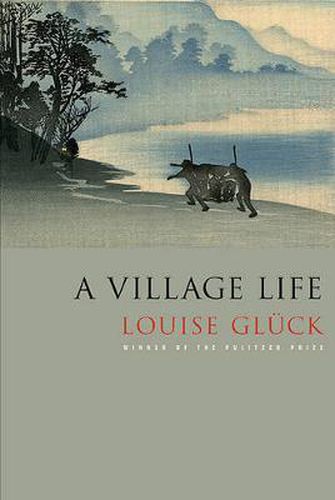Readings Newsletter
Become a Readings Member to make your shopping experience even easier.
Sign in or sign up for free!
You’re not far away from qualifying for FREE standard shipping within Australia
You’ve qualified for FREE standard shipping within Australia
The cart is loading…






A Village Life, Louise Gluck’s eleventh collection of poems, begins in the topography of a village, a Mediterranean world of no definite moment or place:
All the roads in the village unite at the fountain.
Avenue of Liberty, Avenue of the Acacia Trees-
The fountain rises at the center of the plaza;
on sunny days, rainbows in the piss of the cherub.
-from tributaries
Around the fountain are concentric circles of figures, organized by age and in degrees of distance: fields, a river, and, like the fountain’s opposite, a mountain. Human time superimposed on geologic time, all taken in at a glance, without any undue sensation of speed.
Gluck has been known as a lyrical and dramatic poet; since Ararat, she has shaped her austere intensities into book-length sequences. Here, for the first time, she speaks as the type of describing, supervising intelligence found in novels rather than poetry, as Langdon Hammer has written of her long lines-expansive, fluent, and full-manifesting a calm omniscience. While Gluck’s manner is novelistic, she focuses not on action but on pauses and intervals, moments of suspension (rather than suspense), in a dreamlike present tense in which poetic speculation and reflection are possible.
$9.00 standard shipping within Australia
FREE standard shipping within Australia for orders over $100.00
Express & International shipping calculated at checkout
Stock availability can be subject to change without notice. We recommend calling the shop or contacting our online team to check availability of low stock items. Please see our Shopping Online page for more details.
A Village Life, Louise Gluck’s eleventh collection of poems, begins in the topography of a village, a Mediterranean world of no definite moment or place:
All the roads in the village unite at the fountain.
Avenue of Liberty, Avenue of the Acacia Trees-
The fountain rises at the center of the plaza;
on sunny days, rainbows in the piss of the cherub.
-from tributaries
Around the fountain are concentric circles of figures, organized by age and in degrees of distance: fields, a river, and, like the fountain’s opposite, a mountain. Human time superimposed on geologic time, all taken in at a glance, without any undue sensation of speed.
Gluck has been known as a lyrical and dramatic poet; since Ararat, she has shaped her austere intensities into book-length sequences. Here, for the first time, she speaks as the type of describing, supervising intelligence found in novels rather than poetry, as Langdon Hammer has written of her long lines-expansive, fluent, and full-manifesting a calm omniscience. While Gluck’s manner is novelistic, she focuses not on action but on pauses and intervals, moments of suspension (rather than suspense), in a dreamlike present tense in which poetic speculation and reflection are possible.